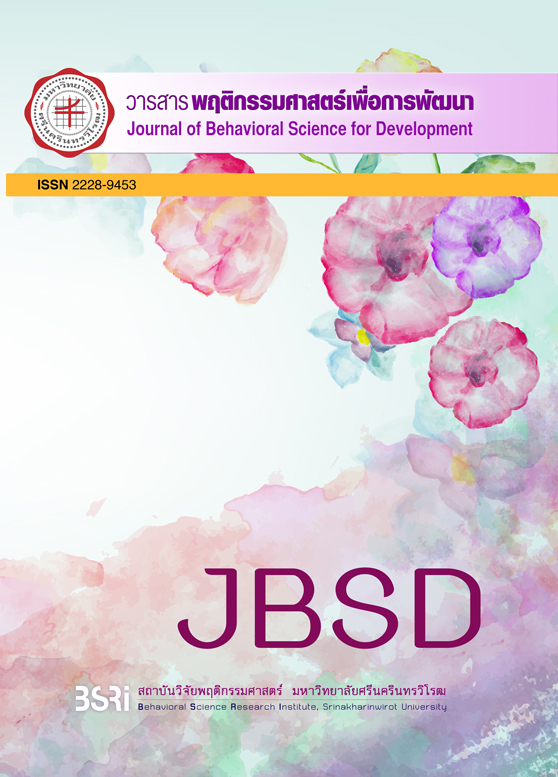The Effect of ‘3 Self ’ Health Behavior Program to Knowledge, Self-Efficacy, Self-Regulation, Self-Care and the Blood Glucose in Pregnant Women at Risk for Gestational Diabetes Mellitus at the Lerdsin Hospital ผลของโปรแกรมการปรับเปลี่ยนพฤติกรรมสุขภาพ 3 Sel
Keywords:
3 Self health behavior program, pregnant women, diabetes mellitusAbstract
The objective of this quasi experimental research was to evaluate the effectiveness of 3 self health behavior program which are self-efficacy, self-regulation, self-care and the blood glucose in pregnant women at risk for developing gestational diabetes mellitus (GDM). In this study, 100 pregnant women at risk for suffering from GDM visiting the ANC clinic of the Lerdsin Hospital participated in the study from January to August 2012. They were equally divided into two groups. The first group served as control group in that women were routinely informed about GDM and its health risks for about 15-20 minutes and in case their blood glucose level was ≥140 mg/dl they were transferred to the physician for receiving the appropriate treatment and follow clinical practice guideline. The second group was selected as the experimental group and exposed to the ‘3 self’’ methodology which are self-efficacy, self-regulation, self-care of patients, including attempts to increase perception about diabetes, starting exercise, and improve food consumption. The female who especially achieved the project’s goals was selected as ‘role model’ to give advise and encouragement to their counterparts. Results: 1) The average age of participants were 30 years, primipara, at the onset of their pregnancy in being less than three months pregnant. The educational background was below a bachelor degree. The risk factors for getting GDM were to be in the age >30 years and being obese before getting pregnant. 2) The knowledge score of the experimental group about GDM, nutritional intake, risk factors, abnormal symptoms, exercise, and behavior during pregnancy was significantly higher than the control group (83.52 scores against 57.78 scores) (p<0.01). 3) The health behavior score of the experimental group about self-efficacy, self-regulation and self-care was higher than for the control group (56.56 scores against 39.54 scores) (p<0.01). 4) The physicians were to 100% satisfied how the females of the experimental group controlled their blood glucose levels while this was only the case for 47% of women from the control group. 5) Ninety six percent of the participants of the experimental group gained weight according to the weight standard (12-15 kg) while only 54% of the participants of the control group could reach that goal, the weight of the rest 46% increased above weight standard. 6) According to the pregnancy care record of the experimental group (at least 5 records) 85% of the women recorded their daily meal intake, exercised at least for 15 minutes daily, recorded their weight once a week , the movement of the fetus in utero, and satisfaction or abnormal symptoms during pregnancy. 7) The experimental group was more satisfied with the health program than the control group (89.5% and 57.78%) (p<0.01).
Keywords: 3 Self health behavior program, pregnant women, diabetes mellitus
บทคัดย่อ
การวิจัยเชิงทดลองนี้ มีวัตถุประสงค์เพื่อศึกษาประสิทธิผลของโปรแกรมการปรับเปลี่ยนพฤติกรรมสุขภาพ 3 Self ที่มีต่อความรู้ การรับรู้ความสามารถ การกำกับพฤติกรรม การดูแลสุขภาพตนเอง และ ระดับน้ำตาลในเลือด กลุ่มตัวอย่างเป็นหญิงตั้งครรภ์ที่เสี่ยงต่อโรคเบาหวานที่มาฝากครรภ์ ร.พ.เลิดสิน ระหว่างมกราคม – สิงหาคม 2555 ใช้การสุ่มแบบชั้นภูมิตามช่วงเวลาที่มารับบริการ กลุ่มควบคุม 50 คน ใช้แนวทางปฏิบัติเดิม สอนสุขศึกษาหน้าห้องตรวจ 15-20 นาที หากมีน้ำตาลในเลือด ≥140 mg% ส่งปรึกษาสูติแพทย์และปฏิบัติตาม CPG ส่วนกลุ่มทดลอง 50 คน ให้ได้รับความรู้และปรับเปลี่ยนพฤติกรรมสุขภาพ 3 Self การเสริมคุณค่าในตนเอง สร้างความตระหนัก การคิดเชิงบวก การแก้ไขปัญหา การจูงใจ มีการแลกเปลี่ยนเรียนรู้ การเลือกรับประทานอาหาร การออกกำลังกาย การปฏิบัติตนขณะตั้งครรภ์ การป้องกันความเสี่ยง การสังเกตอาการผิดปกติ รวมถึงการเล่าประสบการณ์จากต้นแบบที่ประสบความสำเร็จเพื่อเตรียมความพร้อมสร้างความมั่นใจในการปฏิบัติ ผลการศึกษาพบว่า 1) ทั้งสองกลุ่ม มีอายุเฉลี่ย 30 ปี อายุครรภ์น้อยกว่า 3 เดือน เป็นครรภ์แรก มีการศึกษาต่ำกว่าปริญญาตรี โดย 2 อันดับแรกของปัจจัยเสี่ยงต่อการเป็นโรคเบาหวานขณะตั้งครรภ์ :- อายุมากกว่า 30 ปีและภาวะอ้วนก่อนตั้งครรภ์ 2) คะแนนความรู้ ความเข้าใจเกี่ยวกับโรคเบาหวาน อาหาร ความเสี่ยง การออกกำลังกายและการปฏิบัติตนขณะตั้งครรภ์ กลุ่มทดลองมีคะแนนมากกว่ากลุ่มควบคุม (83.52 และ 57.78 คะแนน) (p<0.01) 3) คะแนนการปรับเปลี่ยนพฤติกรรมในการรับรู้ความสามารถตนเอง การกำกับพฤติกรรมและพฤติกรรมดูแลสุขภาพตนเอง กลุ่มทดลองมีคะแนนมากกว่ากลุ่มควบคุม (56.56 และ 39.54 คะแนน) (p<0.01) 4) กลุ่มทดลองมีระดับน้ำตาลในเลือดอยู่ในเกณฑ์ที่อายุรแพทย์รับได้ คิดเป็น 100% ขณะที่กลุ่มควบคุมทำได้เพียง 47% 5) กลุ่มทดลองมีน้ำหนักเพิ่มขึ้นเหมาะสมตามเกณฑ์ (12-15 กิโลกรัม) ได้ถึง 96% ขณะที่กลุ่มควบคุมทำได้เพียง 54% 6) จากการติดตามกลุ่มทดลองตลอดการฝากครรภ์อย่างน้อย 5 ครั้ง พบว่ามีการบันทึกเรื่องอาหารที่รับประทานในแต่ละวัน ออกกำลังกาย 15 นาทีต่อวัน บันทึกน้ำหนักอาทิตย์ละครั้ง บันทึกการดิ้นของทารกในครรภ์ทุกวัน ความประทับใจและการสังเกตอาการผิดปกติได้อย่างต่อเนื่อง คิดเป็น 85% 7) กลุ่มทดลองมีความพึงพอใจสูงกว่ากลุ่มควบคุม ( 89.5% และ 57.78%) (p<0.01)
คำสำคัญ : โปรแกรมการปรับเปลี่ยนพฤติกรรมสุขภาพ 3 Self หญิงตั้งครรภ์ โรคเบาหวาน



